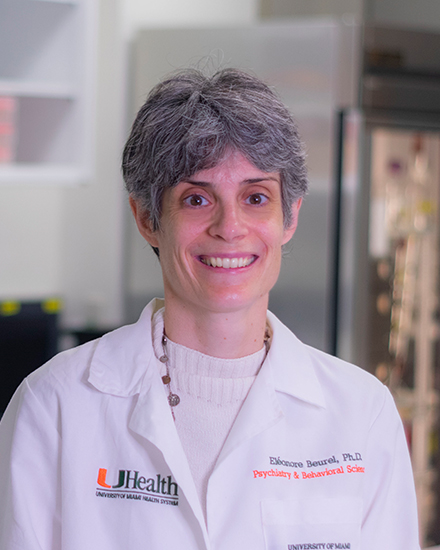
Roles
Associate Professor of Psychiatry & Behavioral Sciences
Associate Professor of Biochemistry and Molecular Biology
Joint Appointment of Biochemistry and Molecular Biology
-
Biography
I earned my Ph.D. in 2005 from the University Pierre and Marie Curie in Paris, France, studying the role of glycogen synthase kinase-3 (GSK3) in regulating apoptosis associated with the use of chemotherapy drugs in the treatment of liver cancer. I then joined the laboratory of Dr. Richard Jope, at the University of Alabama at Birmingham as a postdoctoral fellow. In Dr. Jope’s laboratory, I started a new line of research on neuroinflammation and its regulation by GSK3 and their roles in depression. During this period, I received a NARSAD Young Investigator Award in 2008 and an NIH K99-R00 award (MH090236) in 2010. During my postdoctoral training, I received extensive training in immunology, neuroscience, and biological psychiatry. In November 2011, I was recruited to the University of Miami Miller School of Medicine by Dr. Nemeroff as an Assistant Professor in the Department of Psychiatry and Behavioral Sciences. I became a tenured professor at the University of Miami Miller School of Medicine in 2021. -
Education & Training
Education
Post Graduate Training
-
Honors & Awards
No result found
-
Teaching Interests
My mission as a scientist is to train the next generation of successful scientists. Participating in class might be one part of this mission, but certainly the most critical part of this mission, in my opinion, is to provide students with the tools to face the next challenges of their professional life. Students coming to my lab acquire knowledge around a scientific question as well as adequate training to be able to reason through a scientific question, perform an experiment, identify pitfalls of an experiment and resolve them, develop rigorous ethics, develop communication skills and receive grantsmanship. -
Research Interests
Our research largely consists of a three-pronged attack on the crucial problem of how the immune system modulates stress responses and susceptibility to depression. First, we are following up our discovery that the T cell subtype Th17 cells promote susceptibility to depression. Second, we identified critical signaling mechanisms by which stress induces an inflammatory response and identified a new potential therapeutic intervention ((+)-naloxone). Third, we identified the first specific signaling mechanism by which the gut microbiome releases a chemical signal (Autoinducer-2) to modulate depression sensitivity.
We discovered that a specific subtype of T cells called Th17 cells promote susceptibility to depressive-like behaviors in mice, and for which we identified feasible interventions. The overall objectives of this project are to identify characterize, localize and identify mechanisms of action of Th17 cells after stress and test the potential therapeutic impact of targeting Th17 cells to decrease vulnerability to depression, assessed by measuring depression-like behaviors in mice. This research evolved from the now well-established link between inflammation and depression. Inflammatory cytokines associated with depression drive the production of Th17 cells, and Th17 cells are already well-established to be toxic to the CNS. In mouse models, we found that Th17 cells are able to infiltrate mouse brain parenchyma after stress, these infiltrating cells exhibited characteristics of pathogenic (CCR6+ and IL-23R+) and follicular (CXCR5+) Th17 cells, and the presence of CCR6 on Th17 cells was required for them to promote depression-like behaviors in mice. However, the mechanisms of action of Th17 cells in depression remain to be identified.
Recent evidence has shown that alterations of the gut microbiota influence responses to stress. Microbiota also influences immune responses, in particular certain bacteria regulate the production of Th17 cells. Therefore, our overall hypotheses are that stress that induces depression-like behaviors in mice alters signals generated by certain residents of the microflora, that these signals promote the production of pathogenic Th17 cells, which in turn mediate the induction of depression-like behaviors after stress, and that establishment of depression augments changes in the microbiota that facilitates the continued susceptibility to depression, in part through up-regulated production of Th17 cells. -
Publications
Disclaimer: The information presented in this section has been consolidated using AI and machine learning technologies. While every effort has been made to ensure accuracy, errors may occur. If you identify any inaccuracies, please use this link to inform our data team. Your feedback is greatly appreciated and helps us improve the quality of our content.

